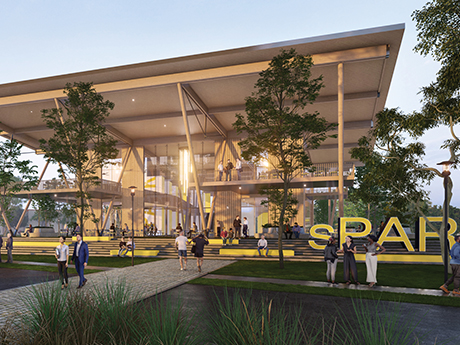While the Research Triangle Park (RTP) is the heartbeat of all things life sciences in the Southeast, the outlying areas of the Raleigh-Durham market, commonly referred to as the Triangle, haven’t been ignored by expansive growth in the sector. Corporate announcements and expansions in Holly Springs, Sanford, Four Oaks and Hillsborough have been more prevalent in recent years, as well as in the home base of Raleigh.
Amgen, a California based company, is constructing a $550 million biomanufacturing facility in Holly Springs, and Becton Dickinson recently selected Four Oaks in Johnston County for its new manufacturing site, with plans to invest approximately $25 million in the development.
After many years of focusing on the manufacturing industry, Lee County, approximately 40 miles from Raleigh, is becoming a burgeoning hub for life sciences after the expansions of Pfizer’s 230-acre site. A subsidiary of Abzena chose Sanford following a nationwide search for its 325-job manufacturing facility. Also in Sanford, Astellas Gene Therapies delivered a $109 million facility in the second quarter, its first outside California.
It is evident that investors and developers see great opportunity in both the heart of the Triangle’s urban cores and rapidly growing outlying counties. Developers are responding to elevated demand for life sciences product with 8.1 million square feet of proposed projects in the overall Triangle market, 5.7 million square feet of which is outside the RTP.
Rezonings, redevelopments
As large tracts of land continue to be in high demand, local municipalities are increasingly focused on making it easier for developers to invest in the types of laboratory and research-and-development (R&D) spaces that prominent life sciences companies are seeking.
In Morrisville, the town council has given way to extensive development opportunities with an approval of zoning and land use changes that would allow for commercial, multifamily and mixed-use developments in two new districts: the Business Activity Center and the Transit Oriented Development district.
As a result of the ease in restrictions, one of the largest proposed developments in the Triangle, Spark LS, a $1 billion, 109-acre biotech campus in Morrisville consisting of lab and biomanufacturing space, is expected to break ground in the third quarter. The project will be built in phases, with the first phase adding three buildings totaling more than 400,000 square feet of dedicated life sciences space.
The Triangle region is also experiencing an uptick in the conversion of office, flex and retail product to lab/R&D space. Some of the most promising conversion opportunities include traditional commercial buildings that are anchored by research universities with direct access to a steady pipeline of STEM graduates — an attribute the Triangle region has no shortage of.
A notable flex-to-life-sciences conversion in Cary is Alloy Properties converting an 18-acre office and industrial property into a 260,000-square-foot life sciences and manufacturing campus called The Press. Additionally, Targan, a biotech company based in Morrisville, will occupy a former 100,000-square-foot vacant Kroger grocery store in Raleigh at a project called Midtown BioCenter.
In recent mergers and acquisitions, Amgen is set to purchase ChemoCentryx for $3.7 billion and at $52 per share, the buyout represents a significant premium at $24.11 per share.
Additionally, Raleigh-based BioDelivery Sciences International entered into a definitive agreement with Collegium Pharmaceutical for a deal valued at $604 million, and Morrisville-based Heat Biologics, a clinical-stage immunotherapy company, has signed an agreement to acquire Elusys Therapeutics. Both deals are expected to close in the third quarter.
Why the Triangle?
The Triangle region is ranked No. 4 in the country for life sciences and continues to grow at a rapid pace. Companies that are looking to expand and/or relocate are afforded many advantages not seen in other areas of the country. Geographically, there is a platform for growth in which a life sciences company has multiple options and access to expanding areas of demographic progress, unlike major markets such as Boston and San Francisco.
Despite the challenges of a global pandemic, economic shutdowns and a corresponding shift to remote operations, the life sciences industry in Raleigh-Durham has continued to hire and expand its employment base. In the combined Raleigh-Durham MSA, life sciences employment grew 7 percent year-over-year between 2020 and 2021. At the same time, employment in R&D and biotechnology experienced the largest growth at 10.5 percent.
Additionally, the barrier of entry is more cost effectiveness and speed-to-market, with permitting and construction timelines reduced from many of our competing markets. The region’s strong economic fundamentals, proximity to three Tier 1 universities, world-renowned medical schools and community colleges all contribute to an exceptional workforce. The solid relationships between educational and private institutions continues to be an incredible facilitator in the recruitment and retainment of talent, which contributes mightily to an already established workforce pipeline.
North Carolina Biotechnology Center was recently one of 21 winners of the Build Back Better Regional Challenge that provides a $25 million grant to assist in training and career opportunities in our region, specifically in the life sciences manufacturing cluster targeting underserved communities.
The investment in bioscience in North Carolina topped $4 billion in 2021, which equated to 4,800 jobs. North Carolina is on everyone’s radar with accolades including the No. 1 state in biologics manufacturing, the No. 1 business climate in the nation and the No. 3 top state for National Institutes of Health (NIH) funding.
Driven by an aging population, steady funding sources and the ever-present desire to improve quality of life, the life sciences industry shows no signs of slowing down. Rather, there is every indication that the growth will continue long after the pandemic.
With more than 80 percent of North Carolina’s life sciences companies based in the Triangle, the sector continues to be a major economic driver for the region. All of which is a plus when looking for a place to conduct business.
Kathy Gigac is a principal with Avison Young. She is consistently recognized as a leading tenant advisor. Kathy leads Avison Young’s national life sciences practice group. This article was originally published in the October 2022 issue of Southeast Real Estate Business.



